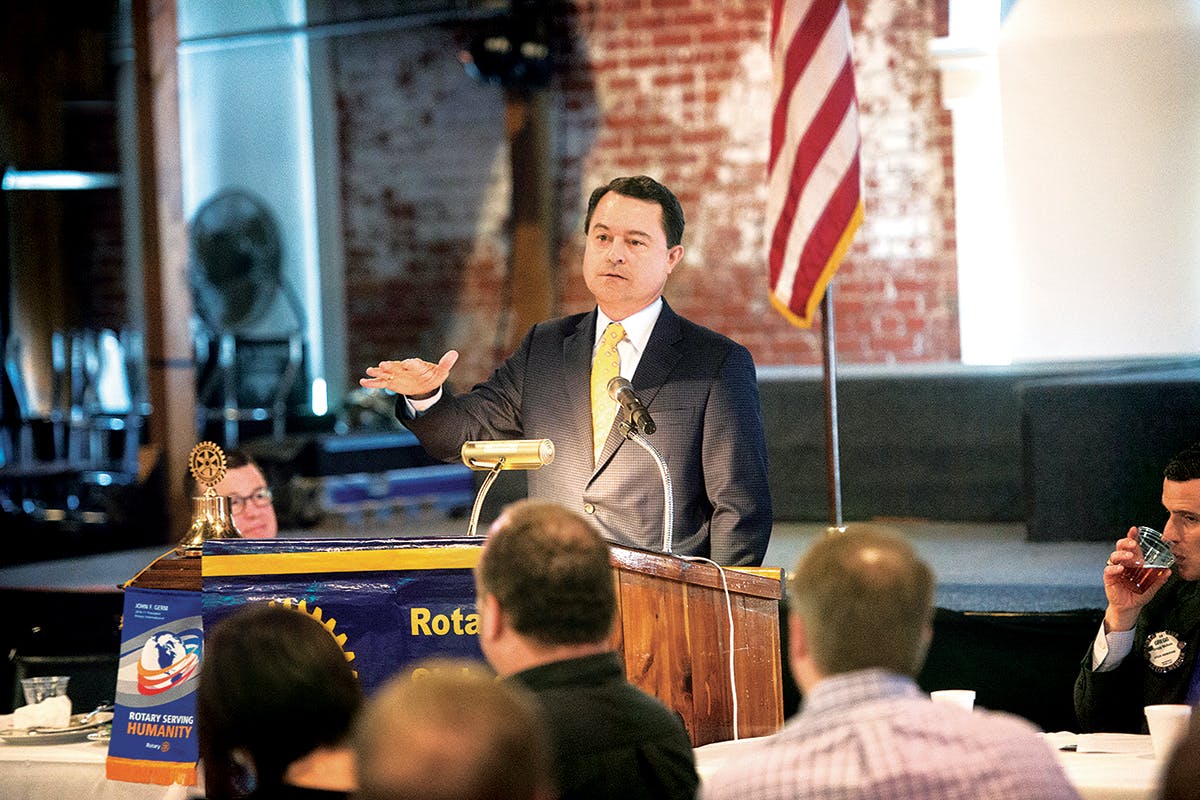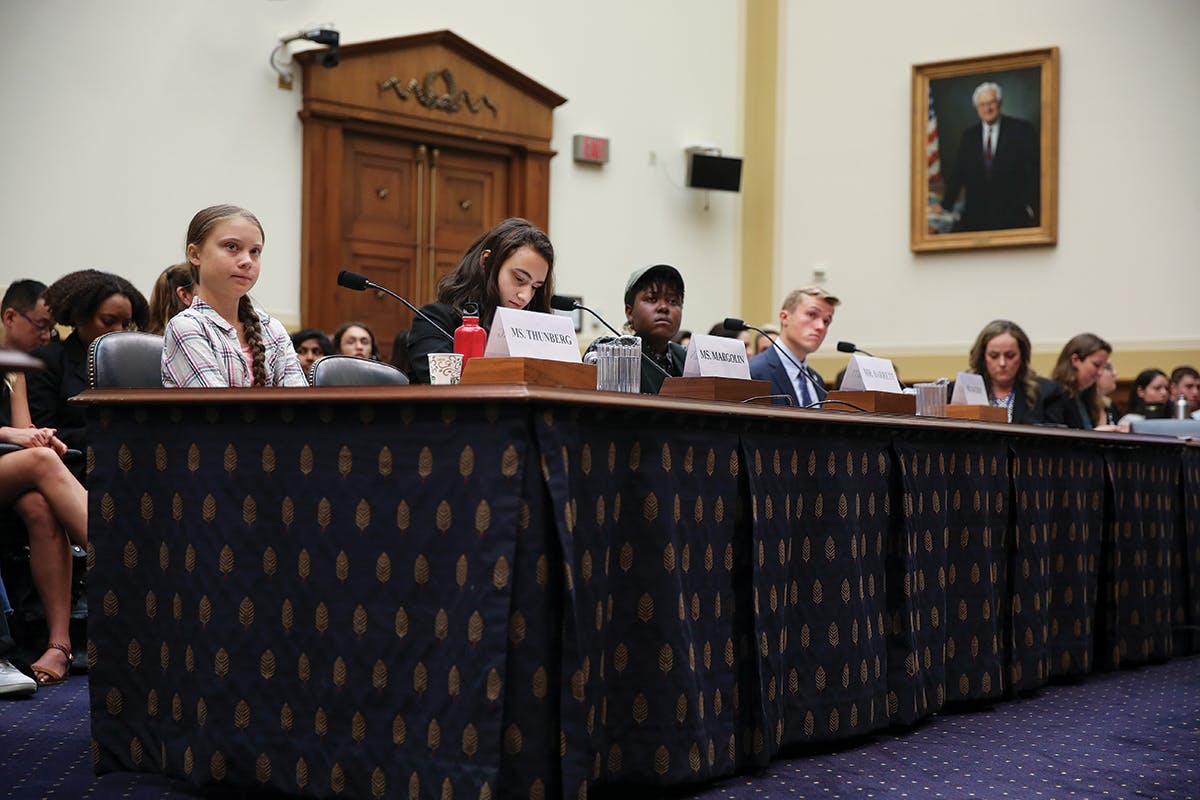On January 10, 1901, Spindletop gushed forth near Beaumont, ushering in the age of oil. An unholy amount of money blanketed Texas, materializing in pocketbooks as if manifested by God. Then, 119 years and four days later, Todd Staples, the president of the Texas Oil and Gas Association, a trade organization for several thousand firms associated with the state’s fossil fuel industries, got on the phone to take questions from the media about the group’s periodic efforts to keep that money flowing—specifically, its plans for the 2020 election. Things took an unexpected turn.
A reporter pointed out that the midterms, in 2018, saw a surge in young voters, who are much more likely than older folks to say they want the government to take action on climate change. Did that concern TXOGA? Staples responded that the organization considered itself an ally of those voters. “The oil and natural gas industry is absolutely committed to climate progress,” he said, “and we want to help get the message out that no one is investing more in low-carbon technology. Every voter needs to know we share a common goal of a lower-emissions future.”
It was a pretty milquetoast statement but a remarkable one coming from Staples. A staunch Republican and former Texas agriculture commissioner, Staples spent his time in office attacking proposals to address climate change and once urged the U.S. Department of Agriculture to fire all its “treasonous” employees involved in promoting “Meatless Monday,” an international climate-conscious campaign to eat vegetarian once a week. In 2010 Staples joined Governor Rick Perry and Attorney General Greg Abbott to promote the state’s lawsuits against the Obama-era Environmental Protection Agency as it attempted to curb the nation’s carbon emissions, and all three sowed confusion about climate science in the process.
The idea that limiting greenhouse gases would be good, which Staples was endorsing, implies that emissions are in some way bad or have negative consequences, a concession with sweeping implications for TXOGA members, not to mention the broader Texas economy. If emitting carbon at current levels is harmful, then it follows, even from a conservative perspective, that the state ought to curb carbon, at least when practical. Was the mouthpiece of Texas Oil calling, indirectly, for a crackdown on the flaring of natural gas or for limits on methane emissions from leaky pipelines? For an end to the massive state and federal subsidies for fossil fuels? Or even for electric cars, solar farms, and nuclear power? Was Staples playing the role of Mikhail Gorbachev, and was this his glasnost (or, ahem, his gasnost)?
Staples took another question: Did TXOGA agree that burning oil and gas contributed to climate change? “We believe that all emissions contribute to climate change, and we believe that our industry is committed to doing our part,” Staples said. “Every emission, wood that’s burned, there’s carbon emissions from multiple sources, and to have a real conversation, we need to look at all sources.”
The suggestion that a family in, say, Burundi, with a wood-burning stove is a coequal culprit in the warming of the planet is an indication that Staples was not exactly channeling Greta Thunberg. But the timing was itself telling. He spoke as unprecedented wildfires ravaged vast swaths of Australia, a leading exporter of coal, putting pressure on Australia’s conservative prime minister to acknowledge the country’s significant carbon output, even as he said he would protect the coal industry. In the United States, there are other signs of a thawing of hard-line messaging on climate change, even during the rule of an administration steadfastly opposed to doing anything about the problem. The American Petroleum Institute, the national counterpart to TXOGA, recently started referring more to the “natural gas and oil” industry, instead of “oil and gas,” emphasizing the more climate-friendly fuel, at least if produced and transported appropriately.
About a week after Staples’s concession, at an event hosted by the conservative Texas Public Policy Foundation, Texas congressman Dan Crenshaw, a 36-year-old former Navy SEAL who has positioned himself as the face of millennial conservatism, introduced a small disturbance in the force by telling the audience that Republicans needed to start taking environmental issues, including climate change, seriously. Crenshaw noted that the environment regularly ranked as a top concern for Democrats, Republicans, and independents alike. “We can make fun of the left’s sort of alarmist views on climate change, and we should, to an extent, but we can’t ignore it completely,” he said, because they were “not totally untrue.” Crenshaw said the GOP should emphasize that climate change could be solved by “innovation, research, and development,” which is more politically palatable to voters than asking them to give up steaks and pickup trucks.

Not a particularly radical sentiment: Crenshaw’s suggestion is still to the “right” of virtually every major conservative party in the developed world. But again, you have to take into account the speaker and his audience. The Texas Public Policy Foundation has ties to fossil fuel interests, and in recent years it has spent generously on a campaign to hobble the thriving Texas wind-power industry while protecting the vast government subsidies that still flow to the oil, gas, and coal industries.
Around the same time that Crenshaw made his comments, Houston’s elite businesspeople gathered for the annual meeting of the Greater Houston Partnership, the powerful business association at the heart of the oil-driven city. In almost any other context, Chair Bobby Tudor’s message to the audience of oil and gas types would have been seen as an invocation of conventional wisdom, but here it was brave, or at least bold: “A consensus has emerged among scientists, business leaders, and the general public that climate change is a real problem that requires urgent attention from all of us, and that we therefore will be using less hydrocarbon-based energy sources.”

What’s in the Pipeline
The annual carbon footprint from new oil and gas facilities in Texas and other Gulf states could be as high as 541 million tons of greenhouse gases by 2030—the equivalent of 131 coal-fired power plants.
The industry was “dramatically out of favor at the moment, in most every corner of the investing and political world,” he said, and it needed urgently to adapt. “At its most basic level, I think we can all agree that having less CO2 emissions in the atmosphere would be a good thing—and as Houston’s business leaders, we need to be committed to working to make that happen.”
For skeptics inclined to think the change in rhetoric was just a PR move, Staples for one was ready to oblige. Two days after his call with reporters, he went on the public radio show the Texas Standard to clean up his spill. It seemed as if he had intended to signal a change in messaging but was surprised by how seriously everyone had taken it. “I think the term ‘climate change’ has been hijacked. I think it’s been used to unfortunately introduce climate hysteria or climate confusion. I think the term is used in such a way to confuse the public that the sky is falling in,” he said.
Much of the industry reacted to Staples’s message—and his subsequent walkback—with a shrug. But some were angry. “Unfortunately, many of these large companies feel the need to apologize rather than stepping up and talking about the dramatic impact cheap, reliable energy has made on our standard of living,” said Kathy Shannon, the executive director of the Permian Basin Petroleum Museum, in Midland. The right-wing advocacy organization Texas Scorecard accused Staples of “jumping on the liberal bandwagon.” One conservative blogger wrote that “one can only assume that Staples is now a non-climate-denier in order to reach future political heights,” perhaps mollifying the left in advance of a new political run. “He’s prepping as a Beto clone.”
Of course, there’s something a little ridiculous about parsing statements from oil and gas trade groups at a time when Australia and the Amazon are burning. There’s a kind of recurrent amnesia that paints climate change as a perennially “new” problem, an issue that is just reaching critical mass of awareness.
It’s shocking today to reflect on just how much we’ve known all along and how much we’ve decided to ignore. Since at least the early 1800s, scientists have been aware of the greenhouse gas effect. In 1856 scientist Eunice Foote established that carbon dioxide was remarkably efficient at trapping infrared heat, like that from the sun, and theorized that a carbon-saturated atmosphere would spike the earth’s temperature. By the 1890s, in the years before Spindletop, researchers had moved on to the question of how fast carbon emissions would heat the earth.
And it’s not as if this scientific knowledge was a secret either. In the 1950s, a short educational film directed by Frank Capra in a cheery midcentury style and screened at schools across the country showed a scientist predicting that thanks to the “waste products of civilization,” future tourists would possibly one day board “glass-bottom boats” to get a glimpse of “the drowned towers of Miami.” Political leaders were also aware of the problem. In the 1980s, politicians as conservative as George H. W. Bush and Margaret Thatcher warned of the urgent threat posed by climate change. As recently as 2008, the presidential candidates of both parties had sweeping plans to rein in carbon emissions. These periods of awareness come and go.
When pressure builds, the industries with the biggest carbon footprints adopt new messaging, and then the pressure dissipates, and life, and heating, goes on. While Staples’s announcement is significant, it also fits neatly into that unfortunate pattern. Which is especially galling, because the industry he represents has known what’s going on for years. Thanks to dogged reporting by Inside Climate News and the Los Angeles Times, we know that as early as 1977, Texas oil giant Exxon, a prominent member of TXOGA, was not only producing its own scientific climate models that calculated future warming trends but also using that knowledge to plan its long-term investments. The next year, Exxon’s chief scientist warned internally that “present thinking holds that man has a time window of five to ten years before the need for hard decisions regarding changes in energy strategies might become critical.” Yet for decades more, the company funded campaigns to muddy the waters and forestall political action—decisions that have not only spawned a wave of lawsuits against Exxon but also transformed the very physical and chemical composition of the atmosphere.
In light of this history, it might seem as if nothing will ever change—at least not in time to stave off the grimmest future scenarios predicted by scientists. But that’s too pessimistic a view. There are reasons for hope, and one of them comes from a most unexpected source: young Republicans.

Benji Backer is a clean-cut, wholesome-looking Wisconsin conservative who cut his teeth arguing with teachers in high school about Republican governor Scott Walker’s fight with public unions. But now, at the age of 22, he’s the president and founder of the American Conservation Coalition, which is trying to sell the Republican party on environmental issues. The group draws inspiration from the legacy of Teddy Roosevelt and Richard Nixon, who championed national parks and oversaw the creation of the EPA, respectively.
Backer knows something that both Staples and Crenshaw alluded to in their remarks: on climate change, young Republicans are closer to Democrats in many ways than older Republicans. A pivotal moment in Backer’s political awakening came when he attended the Conservative Political Action Conference, at the time an important annual gathering of movement conservatives.
There, he connected with other young conservatives who, he learned, considered traditional social issues, like gay marriage, to be irrelevant. Instead, Backer says, the activists wanted to talk about climate change, “a number one issue throughout their entire lives.”
Public opinion surveys bear this out. In October, the Texas Politics Project at the University of Texas revealed a stark generational gap among Republicans on the issue of climate. Only 33 percent of Texas Republicans over forty said they thought climate change was happening, compared to a whopping 70 percent of those under forty. Of those young Republicans who believe it is happening, 61 percent said they’re “very” or “somewhat” worried. Those under-forty Republicans are even more likely to be “very worried” about climate change than independents of all ages.
Such surveys may actually undersell generational differences. As one conservative pointed out to me, young Republicans over the age of thirty or so grew up during the culture wars of the 2000s and developed a distaste for environmentalists, exemplified by Al Gore and the South Park character “ManBearPig”—a cartoon reflection of the popular view that people who talked about climate change were smug, hypocritical weirdos. Young Republicans like Backer don’t see things that way. Even within young Republican groups, Backer says, the gap between younger and older members can be cavernous.
The American Conservation Coalition, it should be said, is not influential, at least not yet. Other conservatives have mocked the group, and only a few elected officials have endorsed its mission, mostly Republicans from the Northeast and the Pacific Northwest. But Backer and his peers stress to other Republicans that climate policy can be a bridge to a younger generation that generally views the party with disdain. And they warn their elders that they’ll be forced to align with Democrats if the GOP refuses to move on an issue some young Republicans feel is existential. “Republicans will keep losing the youth vote if they don’t rethink this,” Backer says.
Backer’s group isn’t alone. Students for Carbon Dividends is a confederation of College Republican clubs that supports the idea of imposing a price on carbon and returning the proceeds to Americans in the form of a tax rebate. Its founding coalition included College Republican and Young Conservative chapters at Texas Christian University, Trinity University in San Antonio, and the University of Houston.
Though the news media focuses on left-wing climate activists, these conservatives might have more of an influence on the climate debate, polarized as it is. But as they know, they’re running out of time to make a mark.
This article originally appeared in the April 2020 issue of Texas Monthly. Subscribe today.
- More About:
- Politics & Policy
- Energy
- Dan Crenshaw









